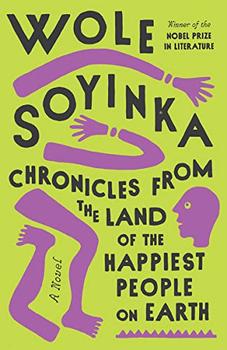Summary | Excerpt | Reviews | Beyond the book | Read-Alikes | Genres & Themes | Author Bio

A Novel
by Wole SoyinkaWole Soyinka is one of Nigeria's most prominent and celebrated literary voices. Among his many accolades, he was awarded the Nobel Prize for Literature in 1986. Since then, he has published plays, essays, memoirs and poetry, but Chronicles from the Land of the Happiest People on Earth is his first novel in nearly 50 years. Chronicles is a vast satirical tome, an absurdist political thriller that, whilst occasionally hilarious, is laced with broiling, bitter anger. Set in a semi-fictionalized Nigeria, Soyinka's tale of political conspiracy rails against the rank corruption of elites and condemns the rampant brutality committed in the name of religion.
In Chronicles, power is concentrated in the hands of two equally despicable, ridiculous figures — Sir Godfrey Danfere, the prime minister (or "People's Steward," as he prefers to be known), and Papa Davina, a self-styled spiritual leader. By working in collusion, the two men have achieved a masterful stranglehold over the nation, disguising the depths of their corruption under superficial acts of bravura. Sir Godfrey is a kind of political caricature, whose obsession with appearing a good leader far surpasses any interest in being one.
Papa Davina cuts a more interesting and enigmatic figure. This is partly because he is given a richly detailed backstory, but it is also because spiritual leadership is a far more insidious disguise for personal greed. Through largely criminal means, "Papa D" has elevated himself to become the head of a church, Ekumenica, which practices all religions (he comically appears in a different religious "costume" each time he meets the public). Ostensibly designed to unify Christianity and Islam, the church is actually little more than a vehicle for Davina's own corrupt ends. Papa D's origin story could almost be called picaresque, were it not for the extent of his moral decrepitude. Forced to abandon his studies in the United Kingdom after being accused of rape, he embarks on a long journey of self-creation that takes him to America and across Africa. Though Soyinka pokes fun at Papa D's warped conscience to great effect, he is also one of the more frightening characters in the book. As long as it is in his own interest, he can commit heinous acts without hesitation or remorse.
Within the landscape shaped and tended by these two corrupt leaders, the central storyline emerges. It concerns two close friends, a contemplative surgeon named Kighare Menka and a bombastic engineer named Duyole Pitan-Payne. Both have built successful careers, but their lives are derailed when Menka is approached by a shadowy underground network trafficking in the sale of human body parts. The business (dubbed, in blackest humor, "Human Resources") is a lucrative one, as body parts are in high demand for use in ritual practices. Disgusted, Menka confides in Pitan-Payne (who is due to leave Nigeria to work for the United Nations), and the two become determined to expose those involved. This is a fraught task, as the network extends to the highest echelons of power. However, the true danger lies closer to home, as the corruption they have unearthed has roots extending far deeper into their personal lives than they could imagine.
Whilst Chronicles is in many ways excellent, it would not be unreasonable to say that it is a difficult book. The plot is so densely woven that it sometimes feels like wandering blindly through a thicket, with so many layers that it veers towards the convoluted. Soyinka's writing is a little baroque, and he has a habit of dropping you into situations first and explaining later. Yet criticisms of style feel frivolous when placed against the importance of the themes he addresses, and the power with which he conveys his message. To be able to do so with such eloquence, not to mention humor, is a great gift.
There is little hope to be found within Chronicles; no light emerges at the end and no good intentions are met with just outcomes. It's perhaps telling that, at the book's launch in Ibadan, the capital of Oyo State in Nigeria, Soyinka described 2020 as "one of the most pessimistic years I have known in this nation and it wasn't just because of COVID-19." However, addressing oppression with brutal honesty can be a step towards resolution. If there is something hopeful about Chronicles, it is perhaps that it has been written at all.
![]() This review was originally published in The BookBrowse Review in October 2021, and has been updated for the
August 2022 edition.
Click here to go to this issue.
This review was originally published in The BookBrowse Review in October 2021, and has been updated for the
August 2022 edition.
Click here to go to this issue.

If you liked Chronicles from the Land of the Happiest People on Earth, try these:

by Afabwaje Kurian
Published 2025
Set against the backdrop of 1970s Nigeria teetering between post-colonial dependency and self-rule, Before the Mango Ripens examines the enduring themes of faith, disillusionment, and the search for belonging. Both epic and intimate, Afabwaje Kurian's debut announces a brilliant new talent for readers of Imbolo Mbue and Chimamanda Ngozi Adichie.

by Abdulrazak Gurnah
Published 2025
In his first new novel since winning the 2021 Nobel Prize, a master storyteller captures a time of dizzying global change.
Your guide toexceptional books
BookBrowse seeks out and recommends the best in contemporary fiction and nonfiction—books that not only engage and entertain but also deepen our understanding of ourselves and the world around us.